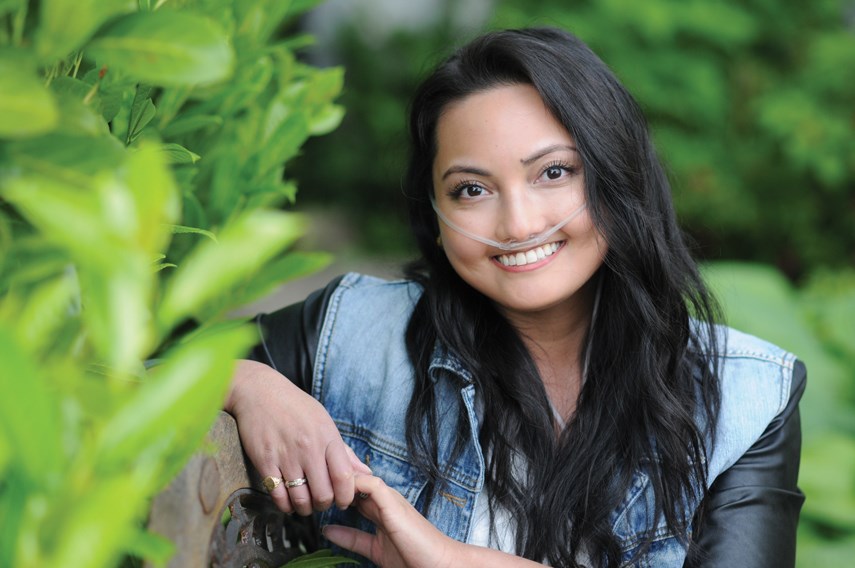She wasn’t going to let a little dry skin interrupt the trip of a lifetime.
North Vancouver resident Cecille Soriano was 19 years old when she absconded to Europe on a backpacking trip. It was there that the first inkling that something might be wrong cropped up, among the ancient ruins, transitory frescos and scenic landscapes of that faraway continent and magical trip.
“I had noticed my skin … had patches that were dry, almost like snakeskin,” Soriano tells the North Shore News. “It was kind of weird. I ignored it for a while because I was 19 and didn’t think there could be anything wrong.”
When Soriano returned to Canada, having decided that her chronic dry skin demanded a doctor’s attention, she got it checked out. Blood work was done and results were examined. She was given a biopsy right away. Soriano learned that she had scleroderma.
“The dermatologist that I went to seemed to be familiar with it, so I didn’t have to go through the process that a lot of people with autoimmune conditions go through where the doctors have no idea what’s going on,” says Soriano. “I think I was officially diagnosed within about a week.”
Scleroderma is a rare autoimmune and chronic disease which affects roughly four out of every 10,000 people, according to the Scleroderma Association of B.C.
Soriano had never even heard of the disease until she realized she was living it. To be diagnosed at 19, like Soriano was, is rare; most people with scleroderma notice symptoms popping up much later in life. The disease can affect everyone differently, but is generally a condition where a person’s immune system turns against itself and attacks its own tissues, usually resulting in the hardening of connective tissues in one’s skin and blood vessels, and eventually affecting the organs.
“Most of symptoms are my skin tightening and I have some esophagus involvement, so my esophagus doesn’t close quite properly so I have to be quite careful with what I’m eating, how much I’m eating, what times I’m eating, and, of course, I do have quite a bit of lung involvement now unfortunately,” says Soriano.
Soriano, now 28, says it was challenging as a young person to learn to navigate the uncertain waters of living with a rare autoimmune disease, but she’s never let it get the better of her either.
She started attending BCIT full time nearly as soon as she had returned from her trip abroad and after having been diagnosed with Scleroderma, determined to carry on with her life.
“I think as soon as I was diagnosed and I did a little bit of research myself, I just went into what-do-I-need-to-do mode,” she says. “You’ve got to do what you’ve got to do.”
After years of living with the disease – and despite the awesome support she continues to receive from friends and family – she felt like she need more help, mainly from people who were living with scleroderma who could relate more intimately with Soriano’s lived experience.
That’s when Soriano connected with the Scleroderma Association of B.C., including the association’s president, Rosanne Queen, who also lives in North Vancouver.
“That same day that I found it, I realized that they were doing the Scotiabank (Community Hot Dog Day) barbecue. I went down with my mom and ended up meeting Rosanne and everyone that was there,” including others closer to her own age who were living with the disease, explains Soriano. She’s been involved with the association ever since.
On June 16, Soriano and others affected by scleroderma will participate in the eighth annual Scleroderma Ride for Research, a 10-kilometre bike ride or walk around the Stanley Park Seawall, along with a 30-kilometre bike ride up to UBC and through downtown, which aims to raise money and awareness for the disease.
“This year I convinced my family I should probably just get up and go,” she says, adding she will likely have to take it easy and walk the distance during the event, which is not intended for the public at large and instead is for people living with scleroderma along with their friends and families. “I’m going to try and wrangle as many people as I can to go with me.”
The goal is to raise approximately $40,000 for scleroderma research. Those interested in learning more or donating to the Ride for Research are encouraged to go to canadahelps.org/en/charities/scleroderma-association-of-bc/p2p/SRR-8/ or sclerodermabc.ca.
The Scotiabank Community Hot Dog Day, another annual scleroderma awareness fundraiser, is scheduled for Friday, May 31 at 1357 Lonsdale Ave. from 11 a.m. to 4 p.m. The whole community is invited to check it out.
Soriano mentions that many people with scleroderma end up developing fibrosis or interstitial lung disease. In the last little while, her own lungs have become a point of focus with regards to her journey with the illness.
“My lungs had been stable for about the eight years since my diagnosis, and in the last year or so it’s definitely gone downhill and I’m on oxygen now. I’m waiting for a double lung transplant,” she says.
Buoyed by her positive outlook and the strong connections she’s made through the Scleroderma Association, Soriano says it can be challenging — but she maintains that this is just another notch in her journey.
“I want to have my career and my own life. This is just something that I deal with as well,” she says. “Yes, we have this disease and yes, it affects how we live our lives, but it doesn’t define who we are as people.”



